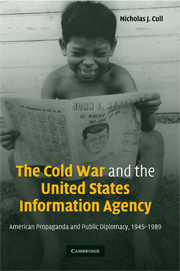 The Cold War and the United States Information Agency
The Cold War and the United States Information Agency Book contents
- Frontmatter
- Contents
- List of Illustrations
- Preface
- Abbreviations
- THE COLD WAR AND THE UNITED STATES INFORMATION AGENCY
- Prologue
- 1 Getting the Sheep to Speak
- 2 Mobilizing “the P-Factor”
- 3 In the Shadow of Sputnik
- 4 Inventing Truth
- 5 Maintaining Confidence
- 6 “My Radio Station”
- 7 Surviving Détente
- 8 A New Beginning
- 9 From the “Two-Way” Mandate to the Second Cold War
- 10 “Project Truth”
- 11 Showdown
- Epilogue
- Conclusion
- Selected Bibliography
- Index
- Plate section
Epilogue
Victory and the Strange Death of the USIA, 1989–99
Published online by Cambridge University Press: 05 February 2015
- Frontmatter
- Contents
- List of Illustrations
- Preface
- Abbreviations
- THE COLD WAR AND THE UNITED STATES INFORMATION AGENCY
- Prologue
- 1 Getting the Sheep to Speak
- 2 Mobilizing “the P-Factor”
- 3 In the Shadow of Sputnik
- 4 Inventing Truth
- 5 Maintaining Confidence
- 6 “My Radio Station”
- 7 Surviving Détente
- 8 A New Beginning
- 9 From the “Two-Way” Mandate to the Second Cold War
- 10 “Project Truth”
- 11 Showdown
- Epilogue
- Conclusion
- Selected Bibliography
- Index
- Plate section
Summary
Everywhere those voices are speaking the language of democracy and freedom, and we hear them and the world hears them, and America will do all it can to encourage them.
George H. W. Bush, 24 May 1989.In the months following Wick's departure, the staff at the USIA saw the work of two generations come to fruition. As the Soviet Union struggled to restructure its ailing economy, Moscow's foreign policy changed. In February, Gorbachev completed his withdrawal of troops from Afghanistan. In June, Solidarity swept to victory in Polish elections. In September, Hungary opened its border with East Germany. On 9 November, the Berlin Wall came down. By the year's end, the dissident playwright Vaclav Havel had been elected president of Czchoslovakia, Bush and Gorbachev had met on Malta and spoken of the Cold War ending, and the crowd had disposed of the Romanian dictator Nicolae Ceauşescu. A new era had begun.
It is moot to consider the role of U.S. public diplomacy in bringing these changes. Eastern European leaders paid repeated tribute to the role of radios in sustaining the hope of freedom and spreading news of the changes that permitted its return. Soviet citizens had seen enough at exhibitions and heard enough over the air to understand the abundance of the West. Their aspirations drew the Kremlin into a race it could never win.
- Type
- Chapter
- Information
- The Cold War and the United States Information AgencyAmerican Propaganda and Public Diplomacy, 1945–1989, pp. 482 - 485Publisher: Cambridge University PressPrint publication year: 2008


